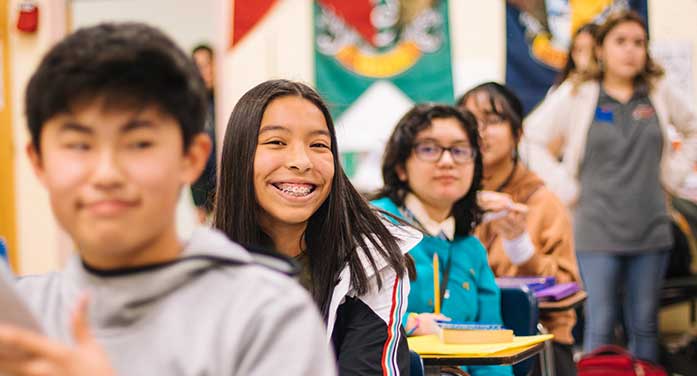By Sen. Raymonde Gagné
and Sen. Mohamed-Iqbal Ravalia
“As an infectious disease specialist, there is nothing sadder than standing at the bedside of a parent in an ICU with a child who’s got a vaccine preventable disease who is dying.” That’s what Dr. Noni MacDonald, professor of pediatrics at Dalhousie University, told us at a recent open caucus meeting in the Senate on vaccine hesitancy.

Raymonde Gagné
No child should die a preventable death. But it’s happening.
Measles outbreaks, for example, are on the rise globally and in Canada, despite the availability of a safe and effective vaccine. According the World Health Organization (WHO), more than 110,000 deaths were attributed to measles in 2017 alone. Most of the deaths were of young children.
Canada has significant room for improvement.
Even though the vast majority of Canadian parents vaccinate their kids, we still have one of the lowest vaccination rates in the developed world. Nearly one-10th of children are not vaccinated and remain vulnerable to a host of potentially fatal, vaccine-preventable diseases.
|
||
| 741 words Reading Time: 3 minutes |
||
Contact us at [email protected] |
According to a recent study, one-third of Canadians expressed ‘vaccine hesitancy’ – a reluctance or refusal to vaccinate despite the availability of vaccines. What’s going on?
For starters, as Sen. Marie-Francoise Mégie put it, we’re fighting a “generational amnesia” where those who have benefited from the health that vaccines afford have never seen first-hand the destruction that preventable illnesses like measles or polio can cause.
MacDonald summarized vaccine hesitancy as a combination of “complacency, convenience and confidence.” Complacency because often other things have more prominence for busy parents than vaccines; convenience because we make immunization too difficult; and confidence because the public has a declining confidence in institutions, governments and care providers.
Then there’s rampant online misinformation. Dr. Timothy Caulfield, professor in the Faculty of Law and the School of Public Health at the University of Alberta, refers to the “mere exposure effect” of social media, “Just being exposed to nonsense … creates a perception of credibility.”
Science literacy is critical to combat fake news and the polarized discourse of social media, he told the open caucus. We need to work with educators to teach critical thinking skills and start young. We also need to address misinformation on platforms like YouTube, Twitter and Facebook.
Dr. Theresa Tam, Chief Public Health Officer of Canada, told the open caucus that public health needs to get better at more targeted and tailored interventions to engage specific populations. We also need to do a better job of understanding the techniques used to divide and undermine trust in vaccines on social media. Public health needs to harness narratives, behavioural insights and social media influencers to counter false information. “Address emotions and not just the facts,” she stressed.
Tam also suggested that discussion of vaccination could start when a woman is pregnant and has the opportunity for longer clinical visits.
André Picard, public health columnist and author, told the panel that instead of demonizing or punishing the vaccine hesitant, we should “endeavour to persuade, not prosecute,” even though that’s more difficult. And we should “counter falsehoods at every opportunity.”
He described the “travesty of public policy” because Canada lacks a single vaccination schedule across provinces and territories, and we don’t even have comprehensive vaccination records. Picard suggested – jokingly (we think) – that we should “lock all the health ministers in a room and don’t let them come out until there’s one vaccine schedule.”
It’s not a bad idea.
Dr. Anna Banerji, faculty lead of Indigenous and Refugee Health at the University of Toronto, put forward the idea of mandatory immunizations “framed in the context of social responsibility.” She also emphasized the need for a specific immunization strategy for Inuit children, who have the highest rates of the deadly respiratory syncytial virus (RSV) in the world.
One thing became clear during the open caucus: It’s time Canada had a national vaccine framework, including a comprehensive national immunization record-keeping system, harmonized vaccine schedule and delivery, in partnership with the provinces. We also need a robust public education campaign.
We need to make it easier for parents to vaccinate their children. It’s time we were all vaccine champions.
Sen. Raymonde Gagné is from Manitoba. She is a member of the Official Languages Committee, Transport and Communications Committee and Agriculture and Forestry Committee in the Senate. Sen. Mohamed-Iqbal Ravalia is from Newfoundland and Labrador. This open caucus meeting on vaccine hesitancy was organized in collaboration with Sen. Stan Kutcher (Nova Scotia), Sen. Rosemary Moodie (Ontario) and Sen. Marie-Francoise Mégie (Quebec).
For interview requests, click here.
The opinions expressed by our columnists and contributors are theirs alone and do not inherently or expressly reflect the views of our publication.
© Troy Media
Troy Media is an editorial content provider to media outlets and its own hosted community news outlets across Canada.





